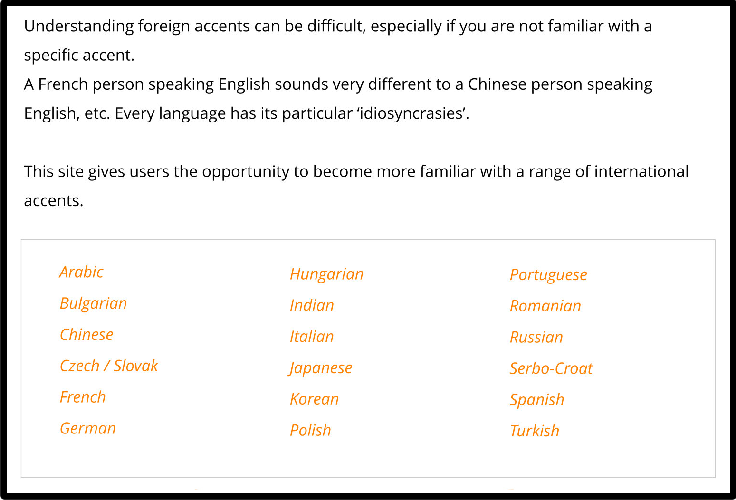SW Higher Education 2023
 |
Module 1: Introduction |
 |
In this module we consider:
|
| Progress: Module 1 of 12 |
 |
Module 1: Introduction |
 |
In this module we consider:
|
| Progress: Module 1 of 12 |
- Introduce yourself
- Explain what you do in your job
- Say what you like about your job
- Describe how your university helps international students
- Introduce yourself
- Explain what you do in your job
- Say what you like about your job
- Describe how your university helps international students
- IELTS Level 6 in speaking is the language level that most universities require for students to study a Bachelor's course.
- In some courses, the speaking requirement is lower.
- Level 6 students do not have perfect English - and are highly likely to benefit if university staff make adjustments to help improve communication.
- IELTS Level 6 in speaking is the language level that most universities require for students to study a Bachelor's course.
- In some courses, the speaking requirement is lower.
- Level 6 students do not have perfect English - and are highly likely to benefit if university staff make adjustments to help improve communication.
 |
Module 1: Introduction |
 |
Summary:
|
| Progress: Module 1 of 12 |
 |
Module 1: Introduction |
 |
Summary:
|
| Progress: Module 1 of 12 |
 |
Module 2: Diversity & Inclusion |
 |
In this module we consider:
|
| Progress: Module 2 of 12 |
 |
Module 2: Diversity & Inclusion |
 |
In this module we consider:
|
| Progress: Module 2 of 12 |
We all have biases, even if we're unaware of many of them.
But please .... don't EVER think that a person's level of English is indicative of their intelligence.
Or even worse, that your opinion somehow matters more than that of a non-native English speaker just because your English is better.
Albert Einstein
We all have biases, even if we're unaware of many of them.
But please .... don't EVER think that a person's level of English is indicative of their intelligence.
Or even worse, that your opinion somehow matters more than that of a non-native English speaker just because your English is better.
Albert Einstein
 |
Module 2: Diversity & Inclusion |
 |
Summary:
|
| Progress: Module 2 of 12 |
 |
Module 2: Diversity & Inclusion |
 |
Summary:
|
| Progress: Module 2 of 12 |
 |
Module 3: Adjusting your English |
 |
In this module we consider:
|
| Progress: Module 3 of 12 |
 |
Module 3: Adjusting your English |
 |
In this module we consider:
|
| Progress: Module 3 of 12 |
 |
Module 3: Adjusting Your English |
 |
Summary
|
| Progress: Module 3 of 12 |
 |
Module 3: Adjusting Your English |
 |
Summary
|
| Progress: Module 3 of 12 |
 |
Module 4: Accents |
 |
In this module we consider:
|
| Progress: Module 4 of 12 |
 |
Module 4: Accents |
 |
In this module we consider:
|
| Progress: Module 4 of 12 |
Why is English pronunciation difficult for international students?
Why is English pronunciation difficult for international students?
Understanding international accents can be difficult.
Each language has its own idiosyncrasies, so the way a French person speaks English will be different to the way a Chinese person speaks, etc…
Understanding international accents is vital for clear communication.

Understanding international accents can be difficult.
Each language has its own idiosyncrasies, so the way a French person speaks English will be different to the way a Chinese person speaks, etc…
Understanding international accents is vital for clear communication.

And there’s another surprising fact – people tend to discriminate against accents we find hard to understand, even if we don’t mean to.
So, understanding accents is also important for Diversity and Inclusion.

And there’s another surprising fact – people tend to discriminate against accents we find hard to understand, even if we don’t mean to.
So, understanding accents is also important for Diversity and Inclusion.

The key to understanding is familiarity.
The SayWhat Accent Tool at end of this program provides over 500 audio recordings of people of 18 different nationalities speaking English.
This will give you exposure to a wide range of international accents.

The key to understanding is familiarity.
The SayWhat Accent Tool at end of this program provides over 500 audio recordings of people of 18 different nationalities speaking English.
This will give you exposure to a wide range of international accents.

 |
Module 4: Accents |
 |
Summary:
|
| Progress: Module 4 of 12 |
 |
Module 4: Accents |
 |
Summary:
|
| Progress: Module 4 of 12 |
 |
Module 5: Vocabulary |
 |
In this module we consider:
|
| Progress: Module 5 of 12 |
 |
Module 5: Vocabulary |
 |
In this module we consider:
|
| Progress: Module 5 of 12 |
This video explains why some English expressions can be difficult to understand and how to avoid them when talking to international students.
This video explains why some English expressions can be difficult to understand and how to avoid them when talking to international students.

Every language has colourful expressions but they can be very difficult for non-native speakers to understand.
Here are some examples; can you match the expression with the meaning?
Good luck!

Every language has colourful expressions but they can be very difficult for non-native speakers to understand.
Here are some examples; can you match the expression with the meaning?
Good luck!
|
|
|
|
Not my circus, not my monkey |

|
|
|
|
|
Give pumpkins to someone |

|
|
|
|
|
Balls of a swan |
 |
|
|
|
|
To let a frog out of your mouth |
 |
|
|
|
|
To emit smoke from 7 orifices |
 |
|
|
|
|
To have the cockroach |
 |
|
|
|
|
A dog in church |
 |
|
|
|
|
Everything has one end, only the sausage has two |
 |
|
|
|
|
To have little monkeys inside your head |
 |
|
|
|
|
Break a fast with an onion |
 |
|
A bigger bang for your buck
A shot in the arm
Acid test - The
All singing, all dancing
An arm and a leg
Back to the drawing board
Barking up the wrong tree
Between a rock and a hard place
Blast from the past - A
Brownie points
Bury the hatchet
Catch 22
Climb on the bandwagon
Cost an arm and a leg
Cut to the chase
Doom and gloom
Double whammy
Down the tubes
Face the music
Filthy rich
|
Flavor of the month - The
Fly off the handle Foot in the door - A Gung ho Have an axe to grind Heads up - A Hold your horses In spades In the bag Jobs for the boys Jump on the bandwagon Jump the gun Jury is still out - The Level playing field - A Lose your marbles Make a bee-line for More bang for your buck My bad No-brainer - A Off the record |
On cloud nine
Pass the buck Pie in the sky Piece of cake - A Pull the wool over your eyes Quality time Rise and shine Road rage Run a mile Run of the mill Sitting pretty Smoke and mirrors Sold down the river Spill the beans The pits The whole nine yards Top notch Wear the trousers What you see is what you get |
|
A bigger bang for your buck
A shot in the arm
Acid test - The
All singing, all dancing
An arm and a leg
Back to the drawing board
Barking up the wrong tree
Between a rock and a hard place
Blast from the past - A
Brownie points
Bury the hatchet
Catch 22
Climb on the bandwagon
Cost an arm and a leg
Cut to the chase
Doom and gloom
Double whammy
Down the tubes
Face the music
Filthy rich
|
Flavor of the month - The
Fly off the handle Foot in the door - A Gung ho Have an axe to grind Heads up - A Hold your horses In spades In the bag Jobs for the boys Jump on the bandwagon Jump the gun Jury is still out - The Level playing field - A Lose your marbles Make a bee-line for More bang for your buck My bad No-brainer - A Off the record |
On cloud nine
Pass the buck Pie in the sky Piece of cake - A Pull the wool over your eyes Quality time Rise and shine Road rage Run a mile Run of the mill Sitting pretty Smoke and mirrors Sold down the river Spill the beans The pits The whole nine yards Top notch Wear the trousers What you see is what you get |
AVOIDING DIFFICULT EXPRESSIONS
So, we suggest that it is sensible to avoid using certain English expressions. But what can we say instead? Here are some ideas to help.
Match these expressions to their plain English meaning:
AVOIDING DIFFICULT EXPRESSIONS
So, we suggest that it is sensible to avoid using certain English expressions. But what can we say instead? Here are some ideas to help.
Match these expressions to their plain English meaning:
At the end of this program you can download more expressions to avoid when communicating with international students.
At the end of this program you can download more expressions to avoid when communicating with international students.
So, we suggest that it is sensible to avoid phrasal verbs. But what can we say instead? Here are some ideas to help.
Match these expressions to their plain English meaning:
So, we suggest that it is sensible to avoid phrasal verbs. But what can we say instead? Here are some ideas to help.
Match these expressions to their plain English meaning:
Have you COME UP WITH any ideas yet?
I hope someone will COME FORWARD to help with this report.
You'll never GET AWAY WITH it.
Write an alternative to the phrasal verb in each sentence. Suggested answers are on the next screen.
Write an alternative to the phrasal verb in each sentence. Suggested answers are on the next screen.
- She often copies my essays, but she never owns up to it.
- I asked for a seat by the window.
-
The security officer looked at the student ID card carefully.
-
Are you talking about the exam results?
-
I found out where my housemate hides his diary.
-
Please bring back library books on time!
- After his exams, he spent a day in bed just to get over them.
Here are some suggested answers.
- She often copies my essays, but she never owns up to it.
admits
-
I asked for a seat by the window.
requested
- The security officer looked at the student ID card carefully.
-
Are you talking about the exam results?
-
I found out where my housemate hides his diary.
discovered
- After his exams, he spent a day in bed just to get over them.
recover from
Here are some suggested answers.
- She often copies my essays, but she never owns up to it.
admits
-
I asked for a seat by the window.
requested
- The security officer looked at the student ID card carefully.
-
Are you talking about the exam results?
-
I found out where my housemate hides his diary.
discovered
- After his exams, he spent a day in bed just to get over them.
recover from
This video looks at how to explain difficult words in a simple way.
This video looks at how to explain difficult words in a simple way.

This video shows how the SayWhat Vocabulary Analyser can check whether the words you use are likely to be understood by non-native speakers.

This video shows how the SayWhat Vocabulary Analyser can check whether the words you use are likely to be understood by non-native speakers.
 |
Module 5: Vocabulary |
 |
Summary:
|
| Progress: Module 5 of 12 |
 |
Module 5: Vocabulary |
 |
Summary:
|
| Progress: Module 5 of 12 |
 |
Module 6: Grammar |
 |
In this module we consider:
|
| Progress: Module 6 of 12 |
 |
Module 6: Grammar |
 |
In this module we consider:
|
| Progress: Module 6 of 12 |
- the order we put words in, and
- which form of a word to use
- the order we put words in, and
- which form of a word to use
Why is English grammar often difficult for international students to learn?
If we can understand the challenges international students face we can focus on what they mean rather than any “mistakes” they make.
Why is English grammar often difficult for international students to learn?
If we can understand the challenges international students face we can focus on what they mean rather than any “mistakes” they make.
- I worked
- I was working
- I have worked
- I have been working
- I had worked
- I had been working
- I worked
- I was working
- I have worked
- I have been working
- I had worked
- I had been working
 PAST TENSES - BE AWARE
PAST TENSES - BE AWARE - 'I spoke to the student about her essay'
- 'I have been speaking to the student about her essay'
 PAST TENSES - BE AWARE
PAST TENSES - BE AWARE - 'I spoke to the student about her essay'
- 'I have been speaking to the student about her essay'
 PAST TENSES - BE AWARE
PAST TENSES - BE AWARE - If Jack was invigilating they would probably not cheat
- Jack is a good invigilator
- I would stay late if I was needed to
- I am happy to stay late
- I wish the textbook wasn’t so long
- I don't like the textbook because it is too long
- Excuse me, I was wondering if this was the room for the finance lecture?
- Is the finance lecture in this room?
 PAST TENSES - BE AWARE
PAST TENSES - BE AWARE - If Jack was invigilating they would probably not cheat
- Jack is a good invigilator
- I would stay late if I was needed to
- I am happy to stay late
- I wish the textbook wasn’t so long
- I don't like the textbook because it is too long
- Excuse me, I was wondering if this was the room for the finance lecture?
- Is the finance lecture in this room?
 NOUNS
NOUNS- a process
- a technique
- an emotion
| VERB | NOUN |
| complete | completion |
| introduce | introduction |
| provide | provision |
| fail | failure |
| arrange | arrangement |
| investigate | investigation |
 NOUNS
NOUNS- a process
- a technique
- an emotion
| VERB | NOUN |
| complete | completion |
| introduce | introduction |
| provide | provision |
| fail | failure |
| arrange | arrangement |
| investigate | investigation |
 WHAT'S WRONG WITH THAT?
WHAT'S WRONG WITH THAT? WHAT'S WRONG WITH THAT?
WHAT'S WRONG WITH THAT? |
Module 6: Grammar |
 |
Summary:
|
| Progress: Module 6 of 12 |
 |
Module 6: Grammar |
 |
Summary:
|
| Progress: Module 6 of 12 |
 |
Module 7: Keep It Simple |
 |
In this module we consider:
|
| Progress: Module 7 of 12 |
 |
Module 7: Keep It Simple |
 |
In this module we consider:
|
| Progress: Module 7 of 12 |
This video looks at how to simplify sentences to make communication clearer.
This video looks at how to simplify sentences to make communication clearer.
WHY it is important to speak slowly and clearly and HOW to do it.
WHY it is important to speak slowly and clearly and HOW to do it.
Why fast speech is a problem for our brain
Why fast speech is a problem for our brain
This video looks at why we sometimes speak too fast
This video looks at why we sometimes speak too fast
Watch this video and take a deep breath...
Watch this video and take a deep breath...
Why English can sound fast - and how to slow it down
Why English can sound fast - and how to slow it down
A practical way of speaking slowly and clearly
A practical way of speaking slowly and clearly
 |
Module 7: Keeping It Simple |
 |
Summary:
|
| Progress: Module 7 of 12 |
 |
Module 7: Keeping It Simple |
 |
Summary:
|
| Progress: Module 7 of 12 |
 |
Module 8: Remote Meetings |
 |
In this module we consider:
|
| Progress: Module 8 of 12 |
 |
Module 8: Remote Meetings |
 |
In this module we consider:
|
| Progress: Module 8 of 12 |




Remote meetings can be particularly challenging for international students.
Remote meetings can be particularly challenging for international students.
 |
Module 8: Remote Meetings |
 |
Summary:
|
| Progress: Module 8 of 12 |
 |
Module 8: Remote Meetings |
 |
Summary:
|
| Progress: Module 8 of 12 |
 |
Module 9: Cultural Differences |
 |
In this module we consider:
|
| Progress: Module 9 of 12 |
 |
Module 9: Cultural Differences |
 |
In this module we consider:
|
| Progress: Module 9 of 12 |
Awareness of cultural differences can help us improve communication.
Awareness of cultural differences can help us improve communication.
BODY LANGUAGE
The academic on the left seems unaware that he has committed a major gaffe. As you probably know, in Middle Eastern cultures it is insulting to cross an ankle over a knee and display the sole of the shoe while talking to another person.
Certainly, if we wish to succeed we need to understand more about the effective, yet powerful "silent language" of gestures.
BODY LANGUAGE
The academic on the left seems unaware that he has committed a major gaffe. As you probably know, in Middle Eastern cultures it is insulting to cross an ankle over a knee and display the sole of the shoe while talking to another person.
Certainly, if we wish to succeed we need to understand more about the effective, yet powerful "silent language" of gestures.
How aware are you of cultural differences in body language?
Try this exercise - hold up your main hand to display the number five - do it now.
Now change it to the number two.
If you're Anglo-Saxon, there's a 96% chance you'll be holding up your middle and index fingers.
If you're European, there's a 94% chance you'll be holding up your thumb and index finger.
Europeans start counting with the number one on the thumb, two on the index finger, three on the middle finger, and so on.
Anglo-Saxons count number one on the index finger, two on the middle finger and finish with five on the thumb.
The Chinese use one hand to count to 10.
How aware are you of cultural differences in body language?
Try this exercise - hold up your main hand to display the number five - do it now.
Now change it to the number two.
If you're Anglo-Saxon, there's a 96% chance you'll be holding up your middle and index fingers.
If you're European, there's a 94% chance you'll be holding up your thumb and index finger.
Europeans start counting with the number one on the thumb, two on the index finger, three on the middle finger, and so on.
Anglo-Saxons count number one on the index finger, two on the middle finger and finish with five on the thumb.
The Chinese use one hand to count to 10.
Use gestures
Use gestures
Some hand gestures can cause problems in different parts of the world. At the end of the program you can download our comprehensive hand gesture guide.
Some hand gestures can cause problems in different parts of the world. At the end of the program you can download our comprehensive hand gesture guide.
BLOWING YOUR NOSE
Europeans and Westerners blow their noses into a handkerchief or tissue while Asians spit or snort. Each is appalled by the others' behavior.
This cultural difference is the result of the spread of tuberculosis (TB) in past centuries. In Europe, governments instructed people to blow their nose to avoid further spreading this deadly disease. This is why Westerners react so strongly to spitting - spitting would have spread TB.
If TB had been a problem in Eastern countries, the cultural reaction might have been the same.
Asians believe, correctly, that it is a healthier option to spit but it is a habit that is repulsive to Westerners. This is why business meetings between Westerners and Asians can fail when they've all got a cold.
The Japanese are appalled when someone produces a handkerchief, blows their nose into it and puts it back in their pocket or up their sleeve!
In Asian countries, the English custom of men wearing a handkerchief in their jacket top pocket is the equivalent of dangling a roll of toilet paper, ready for action.
So don't feel upset by an Asian who spits or snorts and never blow your nose in front of a Japanese person.
BLOWING YOUR NOSE
Europeans and Westerners blow their noses into a handkerchief or tissue while Asians spit or snort. Each is appalled by the others' behavior.
This cultural difference is the result of the spread of tuberculosis (TB) in past centuries. In Europe, governments instructed people to blow their nose to avoid further spreading this deadly disease. This is why Westerners react so strongly to spitting - spitting would have spread TB.
If TB had been a problem in Eastern countries, the cultural reaction might have been the same.
Asians believe, correctly, that it is a healthier option to spit but it is a habit that is repulsive to Westerners. This is why business meetings between Westerners and Asians can fail when they've all got a cold.
The Japanese are appalled when someone produces a handkerchief, blows their nose into it and puts it back in their pocket or up their sleeve!
In Asian countries, the English custom of men wearing a handkerchief in their jacket top pocket is the equivalent of dangling a roll of toilet paper, ready for action.
So don't feel upset by an Asian who spits or snorts and never blow your nose in front of a Japanese person.
 |
Module 9: Cultural Differences |
 |
Summary:
|
| Progress: Module 9 of 12 |
 |
Module 9: Cultural Differences |
 |
Summary:
|
| Progress: Module 9 of 12 |
 |
Module 10: Politeness |
 |
In this module we consider:
|
| Progress: Module 10 of 12 |
 |
Module 10: Politeness |
 |
In this module we consider:
|
| Progress: Module 10 of 12 |
This video looks at how to be polite in different cultures.
This video looks at how to be polite in different cultures.
Use positive words – e.g. good rather than bad - where you can:
- This is not good ✔
- This is bad ✘
Use positive words – e.g. good rather than bad - where you can:
- This is not good ✔
- This is bad ✘
A real-life example:
Pablo Díaz, a Mexican executive has worked in China for a Chinese textile company for 15 years.
"In China, the message up front is not necessarily the real message," Díaz said. "My Chinese colleagues would drop hints, and I wouldn't pick them up. Later, when thinking it over, I would realize I had missed something important."
Case in point, this conversation:
Mr. Díaz: It looks like some of us are going to have to be here on Sunday to host the client visit.
Mr. Chen: I see.
Mr. Díaz: Can you join us on Sunday?
Mr. Chen: Yes, I think so.
Mr. Díaz: That would be a great help.
Mr. Chen: Yes, Sunday is an important day.
Mr. Díaz: In what way?
Mr. Chen: It's my daughter's birthday.
Mr. Díaz: How nice. I hope you all enjoy it.
Mr. Chen: Thank you. I appreciate your understanding.
"I was quite certain he had said he was coming," Díaz said. "And Mr. Chen was quite certain he had communicated that he absolutely could not come because he was going to be celebrating his daughter's birthday with his family."
Díaz learned from this experience that it's his responsibility to ask multiple times for clarification to understand what his workers really mean.A real-life example:
Pablo Díaz, a Mexican executive has worked in China for a Chinese textile company for 15 years.
"In China, the message up front is not necessarily the real message," Díaz said. "My Chinese colleagues would drop hints, and I wouldn't pick them up. Later, when thinking it over, I would realize I had missed something important."
Case in point, this conversation:
Mr. Díaz: It looks like some of us are going to have to be here on Sunday to host the client visit.
Mr. Chen: I see.
Mr. Díaz: Can you join us on Sunday?
Mr. Chen: Yes, I think so.
Mr. Díaz: That would be a great help.
Mr. Chen: Yes, Sunday is an important day.
Mr. Díaz: In what way?
Mr. Chen: It's my daughter's birthday.
Mr. Díaz: How nice. I hope you all enjoy it.
Mr. Chen: Thank you. I appreciate your understanding.
"I was quite certain he had said he was coming," Díaz said. "And Mr. Chen was quite certain he had communicated that he absolutely could not come because he was going to be celebrating his daughter's birthday with his family."
Díaz learned from this experience that it's his responsibility to ask multiple times for clarification to understand what his workers really mean.
“I’m not sure if this is really quite what I was looking for” ✗
“It would be nice if you could come to the tutorial” ✗
“Please come to the tutorial” ✔
“I’m not sure if this is really quite what I was looking for” ✗
“It would be nice if you could come to the tutorial” ✗
“Please come to the tutorial” ✔
- Remember, we try to be polite to show people respect and to get things done.
- Nobody feels positive when projects fail due to misunderstandings.
- It is usually better to be simple and direct.
- Remember, we try to be polite to show people respect and to get things done.
- Nobody feels positive when projects fail due to misunderstandings.
- It is usually better to be simple and direct.
 |
Module 10: Politeness |
 |
Summary:
|
| Progress: Module 10 of 12 |
 |
Module 10: Politeness |
 |
Summary:
|
| Progress: Module 10 of 12 |
 |
Module 11: Summary |
 |
In this module we consider:
|
| Progress: Module 11 of 12 |
 |
Module 11: Summary |
 |
In this module we consider:
|
| Progress: Module 11 of 12 |
This video looks at some of the main reasons for this training.
This video looks at some of the main reasons for this training.

OVERVIEW
- Support for international students needs to be university-wide.
- All staff can help international students by adjusting their English as necessary.
- Globally, English is mostly spoken by non-native English speakers.
- There is no single “correct” form of English.
- Passing an English test does not mean “perfect” English.

OVERVIEW
- Support for international students needs to be university-wide.
- All staff can help international students by adjusting their English as necessary.
- Globally, English is mostly spoken by non-native English speakers.
- There is no single “correct” form of English.
- Passing an English test does not mean “perfect” English.

DIVERSITY & INCLUSION
- Language is an overlooked area of Diversity & Inclusion.
- International students can feel excluded because English is not their first language.
- We are hard-wired to judge people on the way they speak.
- Be aware of any unconscious biases you may have.
- Each of us can help include ESL speakers & make education better for all.

DIVERSITY & INCLUSION
- Language is an overlooked area of Diversity & Inclusion.
- International students can feel excluded because English is not their first language.
- We are hard-wired to judge people on the way they speak.
- Be aware of any unconscious biases you may have.
- Each of us can help include ESL speakers & make education better for all.

ADJUSTING YOUR ENGLISH
Look for signs that an international student needs you to adjust your English:
- Speaking slowly
- Hesitations
- Using the same tense
But remember that someone’s level of English can seem lower than it is.
A person’s level of English is NOT indicative of their intelligence.

ADJUSTING YOUR ENGLISH
Look for signs that an international student needs you to adjust your English:
- Speaking slowly
- Hesitations
- Using the same tense
But remember that someone’s level of English can seem lower than it is.
A person’s level of English is NOT indicative of their intelligence.
PRONUNCIATION
English is not a phonetic language. Words are not always pronounced the way they are written.
- Though
- Through
- Cough
- Rough
- Plough
- Ought
- Borough
Some sounds in English do not exist in other languages.
Try to focus on WHAT students mean rather than HOW they say it.
And remember, globally, most English is spoken between non-native speakers. This means that our accent can sound very strange to them!
PRONUNCIATION
English is not a phonetic language. Words are not always pronounced the way they are written.
- Though
- Through
- Cough
- Rough
- Plough
- Ought
- Borough
Some sounds in English do not exist in other languages.
Try to focus on WHAT students mean rather than HOW they say it.
And remember, globally, most English is spoken between non-native speakers. This means that our accent can sound very strange to them!
VOCABULARY
- Try to use simple, logical expressions wherever possible.
- Avoid colorful expressions which don’t have a literal meaning.
In spades - Lots of
Jump the gun - Start something too early
Hold your horses - Wait
- Try not to use phrasal verbs (verb + preposition / adverb) – they don’t have a literal meaning
Come up with (an idea) - Think of
Bring up (a problem) - Mention
Get away with it - Escape the consequences
- If you need to explain what a word means, try to define it rather than use lots of alternatives.
A stakeholder can be a client, customer, colleague, manager, owner, supplier
A stakeholder is anybody involved with a project
- Use the SAY WHAT? Vocabulary Analyzer to check whether your emails / written communication is likely to be understood by international students.
VOCABULARY
- Try to use simple, logical expressions wherever possible.
- Avoid colorful expressions which don’t have a literal meaning.
In spades - Lots of
Jump the gun - Start something too early
Hold your horses - Wait
- Try not to use phrasal verbs (verb + preposition / adverb) – they don’t have a literal meaning
Come up with (an idea) - Think of
Bring up (a problem) - Mention
Get away with it - Escape the consequences
- If you need to explain what a word means, try to define it rather than use lots of alternatives.
A stakeholder can be a client, customer, colleague, manager, owner, supplier
A stakeholder is anybody involved with a project
- Use the SAY WHAT? Vocabulary Analyzer to check whether your emails / written communication is likely to be understood by international students.
- Some types of English grammar don’t have equivalents in other languages
- Try to focus on what students mean rather than any “mistakes” they make
- Try to use simple grammar where you can
- Some types of English grammar don’t have equivalents in other languages
- Try to focus on what students mean rather than any “mistakes” they make
- Try to use simple grammar where you can
KEEP IT SIMPLE
Try to keep sentences to a maximum of 20 words.
Remove unnecessary information from sentences.
- This plan is kind of interesting.
- I’m slightly concerned about this proposal.
Avoid using fillers
- Um, like, you know…
Try and speak slowly and clearly.
- Allow students time to process what you have said
- Allow students time to “translate” your words
- Pause between phrases
Aim to speak at around 150 words per minute.
You can use the SAY WHAT? Rate of Speech analyser (at the end of this program) to help you practise.
KEEP IT SIMPLE
Try to keep sentences to a maximum of 20 words.
Remove unnecessary information from sentences.
- This plan is kind of interesting.
- I’m slightly concerned about this proposal.
Avoid using fillers
- Um, like, you know…
Try and speak slowly and clearly.
- Allow students time to process what you have said
- Allow students time to “translate” your words
- Pause between phrases
Aim to speak at around 150 words per minute.
You can use the SAY WHAT? Rate of Speech analyser (at the end of this program) to help you practise.

REMOTE MEETINGS
Communicating over the telephone or via Zoom is much more difficult for international ESL students.
Less is more.
Use people's names more than usual.
Don't be afraid to ask for repetition.
Check / clarify / confirm.

REMOTE MEETINGS
Communicating over the telephone or via Zoom is much more difficult for international ESL students.
Less is more.
Use people's names more than usual.
Don't be afraid to ask for repetition.
Check / clarify / confirm.
- Use positive words – e.g. good rather than bad - where you can.
- Body language can be a minefield and varies greatly around the world. However, facial expressions and smiles register the same meanings to people almost everywhere.
- Beware the 'communication gap': some cultures speak in more 'explicit' terms while others speak in more 'implicit' terms.
- Try to avoid understatement, subtlety and overly-polite language.
- Use positive words – e.g. good rather than bad - where you can.
- Body language can be a minefield and varies greatly around the world. However, facial expressions and smiles register the same meanings to people almost everywhere.
- Beware the 'communication gap': some cultures speak in more 'explicit' terms while others speak in more 'implicit' terms.
- Try to avoid understatement, subtlety and overly-polite language.
- Introduce yourself
- Explain what you do in your job
- Say what you like about your job
- Describe how your university helps international students
- Introduce yourself
- Explain what you do in your job
- Say what you like about your job
- Describe how your university helps international students
 |
Module 12: Gift Bag |
 |
In this module:
|
| Progress: Module 12 of 12 |
 |
Module 12: Gift Bag |
 |
In this module:
|
| Progress: Module 12 of 12 |

- The meaning of different hand gestures around the world - here
- Expressions to avoid - here
- Measure how fast you speak - here
- The SAY WHAT? Vocabulary Analyzer - here
- Cultural fluency guide - here
- Understanding different nationalities speaking English can be really difficult, especially if you're not very familiar with a specific accent. Every nationality has its own ‘peculiarities’ when it comes to English pronunciation and intonation.
This tool gives you access to 500+ audio recordings (with transcripts) of internationally-accented English.
Click here (username saywhat password 456#WLT)

- The meaning of different hand gestures around the world - here
- Expressions to avoid - here
- Measure how fast you speak - here
- The SAY WHAT? Vocabulary Analyzer - here
- Cultural fluency guide - here
- Understanding different nationalities speaking English can be really difficult, especially if you're not very familiar with a specific accent. Every nationality has its own ‘peculiarities’ when it comes to English pronunciation and intonation.
This tool gives you access to 500+ audio recordings (with transcripts) of internationally-accented English.
Click here (username saywhat password 456#WLT)





